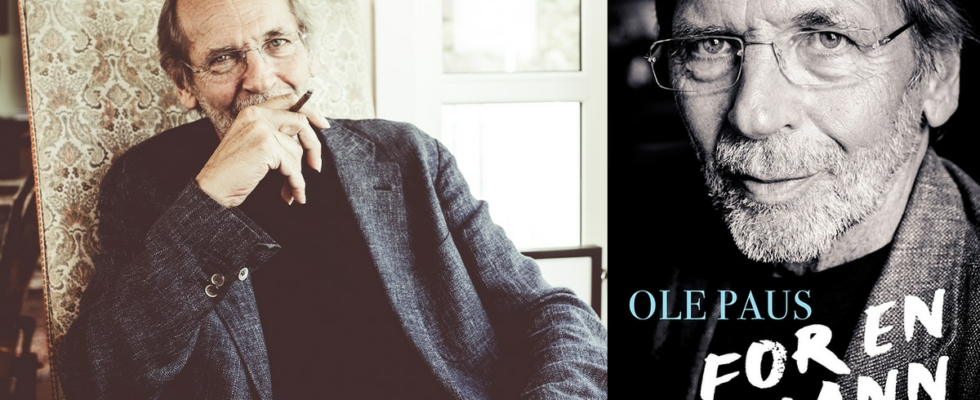It is the biographical autumn of the Norwegian rock and music gurus. Odd Nordstoga, Øystein Sunde, Bjarne Brøndbo and Åge Aleksandersen are all out with books about their lives and careers. Now it’s Ole Paus’ turn. Except he never finished. The singer had been writing on and off about his life for several years, when he suffered a stroke last autumn. He passed away just before Christmas, aged 76. The text is published as he left it, the publisher has only proofread it. The title is also his own, and should be read with a hat on. “I’m too small for my life” Paus writes as he spoke: strolling, a little in passing, with digressions and glimpses of poetry. He is self-deprecating and at times self-examining, as when he contemplates life in the far too large house he has bought in Svartskog outside Oslo: “Everything around me is far too big. It is my fault that it has become like this. I am too small for my life.” The book could also be called “For a life”; here is enough material for a TV series. He writes closely and well about his upbringing, about his mother who died of polio when he was four years old, before the memories could take hold. The General father was strict and absent; Ole and his older brother grew up with their grandmother and aunt while their father worked abroad: “The war never really ended in my childhood”. He himself began to write poetry as a boy, and became a semi-anarchist in his youth. COLLABORATION: Ole Paus on stage with Motorpsycho in the Opera in 2020. Photo: NTB Opbrudd The majority of the text is devoted to the start of his career and the people who shaped it. Paus was discovered by the two Alfs Cranner and Prøysen, and made their record debut with “Der ute, der inne” in 1970. Time is depicted so closely that one wishes for a time machine. He hung out with writers such as Jens Bjørneboe and André Bjerke, was cohabitant with actress Henny Moan, before he left her for another woman. And he didn’t just break women’s hearts. When he was provided, he broke up, went on. Collaborators, record companies, managers and landlords stood back confused or hurt. In several passages, Paus ponders why it turned out this way. He searches for connection and meaning, recognizes himself in his grandfather, who also double-booked his own life: “No matter what he started with, it ended as an escape attempt.” “It was as if he couldn’t stand that life was becoming too easy.” This is what music journalist and author Asbjørn Bakke writes in the afterword, which is as long as the autobiography. ANOTHER PERSPECTIVE: Music journalist Asbjørn Bakke has written the afterword in the book. Photo: Signe Dons Bakke nuances the picture Paus draws of himself, corrects the rather sloppy shrug style, he contributes his own thoughts and analyses, and never irons out. Rather, he shows us a complex and sometimes twisted human being. Because as he says: “A person with a harmonious life could never write these texts.” 14 kilos of hate mail I thoroughly enjoy reading about how the hate songs came to be, the ones that made up the famous/notorious “Paus-posten”. And not least the reactions to the sour satire. In 1978, the thousand homes were served the song “Satan Lives” in the middle of the Saturday entertainment, in the program Etter Dagsrevyen. According to Paus, the public broadcaster received 14 kilos of hate mail and over 40,000 protest signatures. In one weekend. The performance ended up in Question Time in the Storting; Paus was censored by news. SCANDAL: See the feature in “Etter Dagsrevyen”, with the song which, according to Ole Paus, led to kilos of letters of complaint to news in 1978. This was the same guy who wrote “Mitt lille land” and “Innerst i sjelen” a few decades later, and got Lene Marlin and the rest of the Norwegian people to hoot under “Every time we meet”. This was the man who stirred up both Kristen-Norge and Se og Hør, was a revue star and TV presenter, made advertising cassettes, found God, voted yes to the EU, collaborated with Motorpsycho. Complex? So absolutely! Poesi Paus kicked well, but never downwards. He was endowed with fervor and empathy for the outcast, and turned it into poetry. The poetic fine feeling is also expressed here, in lovely little notes, scribbled down in a corona-closed Oslo, in his apartment with a view of Vår Frelsers Gravlund. “For a man” will surely be devoured by the parents’ generation looking for a nostalgia trip, but can just as easily be read by generation Z, who want a wow experience: Was it possible to live like that? Yes, but that life did not come without consequences. news reviews Title: “For a man: prelude to an autobiography” Author: Ole Paus and Asbjørn Bakke Publisher: Kagge Forlag Date: 15 October 2024 ISBN: 9788248928508 Hello, book lovers! I am a freelance writer and review books for news. I love everything from dizzying page-turners to short short stories and narrative non-fiction. The last book I read in shreds was “Jævla menn” by Andrev Walden, and my heart beats extra hard for Lorrie Moore and Geoff Dyer. Please contact me if you have input for the review or tips on books I should read! Published 15.10.2024, at 00.00
ttn-69
“For a man” by Ole Paus and Asbjørn Bakke – news Culture and entertainment

